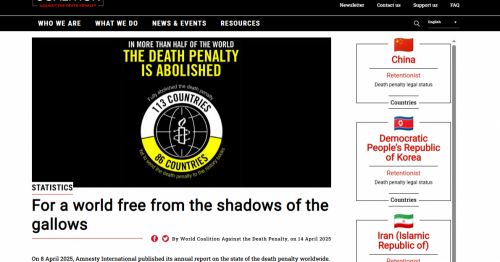
https://worldcoalition.org/2025/04/14/for-a-world-free-from-the-shadows-...
Global trend towards abolition in 2024
Developments in 2024 confirmed that the use of the death penalty is reserved to an ever-increasing minority. For the second consecutive year, Amnesty International recorded executions in the lowest number of countries – 15.
On 31 December, President Emmerson Mnangagwa of Zimbabwe signed into law a bill that abolished the death penalty for ordinary crimes. Earlier in the month, Zambia, which fully repealed the death penalty in 2023, made abolition irreversible by ratifying the Second Optional Protocol to the International Covenant on Civil and Political Rights, aiming at the abolition of the death penalty. Together with the adoption by the African Commission on Human and Peoples’ Rights of its fifth resolution calling for a moratorium on executions, these advances indicated that Africa remained the beacon of hope of abolition.
Progress in other countries also showed that, with continued advocacy, it is just a matter of time before the death penalty will be fully abolished globally. The abolition of the mandatory death penalty in Malaysia in 2023 and a subsequent resentencing process led to a reduction by more than 1,000 in the number of people at risk of execution.
Outgoing US President Biden commuted the death sentences of 37 out of 40 people on federal death row; and Roy Cooper, then Governor of North Carolina, commuted 15 death sentences as the year ended, among other notable reductions.
In December, a vote of the tenth General Assembly resolution on a moratorium on the use of the death penalty saw for the first time more than two thirds of all UN member states voting in favour. Support for this resolution has continued to increase since the first of these resolutions was adopted in 2007, demonstrating that states are steadily moving closer to rejecting the death penalty as a lawful punishment under international human rights law.
Furthermore, the world witnessed the power of campaigning. Hakamada Iwao – who spent nearly five decades on death row in Japan – was acquitted in September 2024.
“When people prioritize campaigning for an end to the death penalty, it really does work,” said Agnès Callamard, Amnesty International’s Secretary General. “Despite the minority of leaders determined to weaponize the death penalty, the tide is turning. It’s only a matter of time until the world is free from the shadows of the gallows.”
1,518 executions were recorded in 2024, 91% in just 3 countries: Iran, Iraq and Saudi Arabia
The known totals did not include thousands of people believed to have been executed in China, which remained the world’s lead executioner; and North Korea and Viet Nam, countries believed to continue to carry out executions extensively but where access to information is restricted.
In 2024, the death penalty remained a prominent tool used by several governments to exert control on the population and stifle dissent, particularly targeting human rights defenders, protesters, dissidents, and political opponents, and having a disproportionate impact on those belonging to ethnic or religious minorities and from disadvantaged socio-economic backgrounds. Over 40% of 2024’s executions were carried out unlawfully for drug-related offences.









